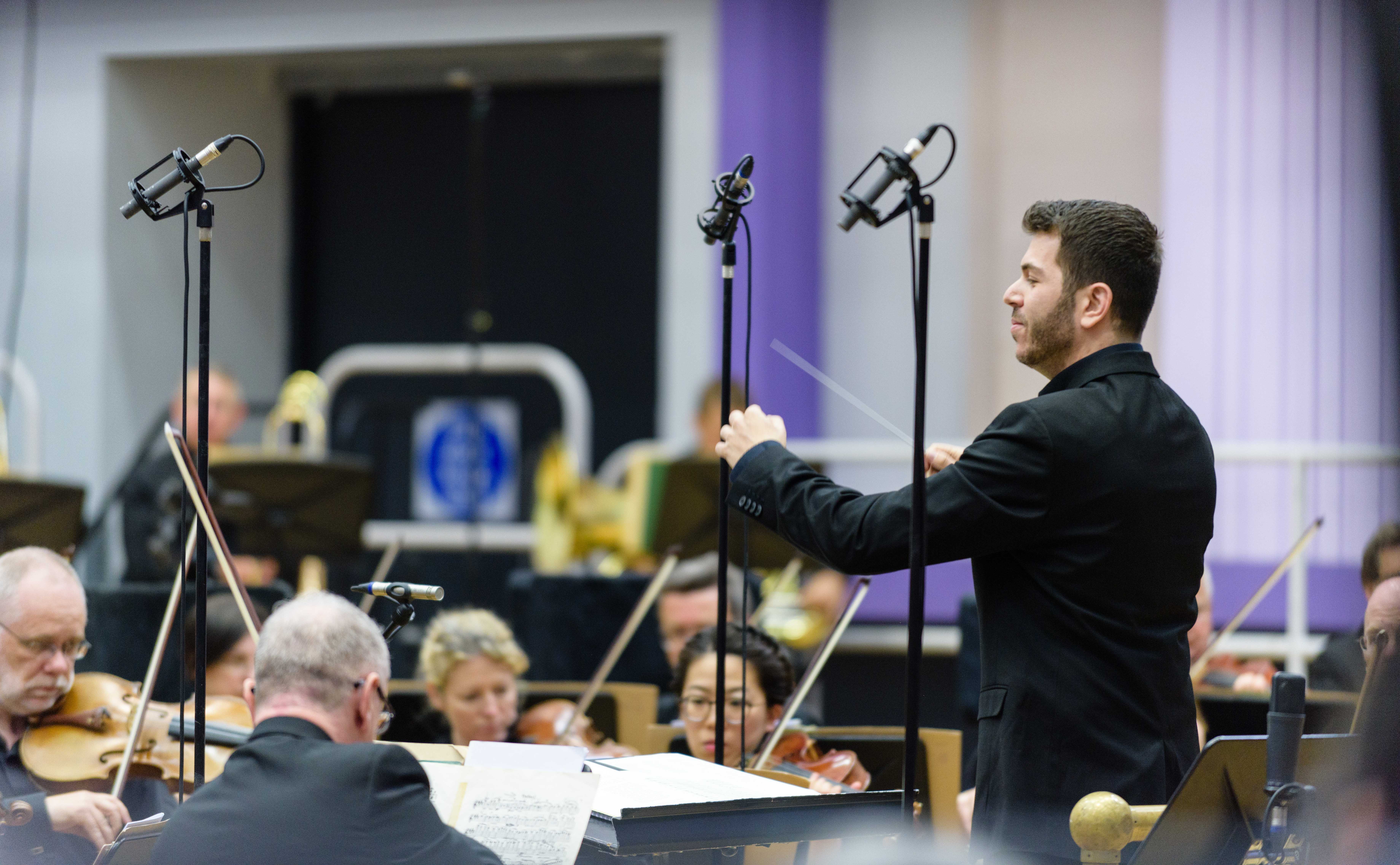Postgraduate Conducting
On our Master of Music (MMus) programme you’ll receive unrivalled opportunities to develop your craft and prepare for a career.
You will pursue conducting as your Principal Study through this degree, but please note that the one-year intensive option isn’t available for this discipline; all students follow the two-year route.
We generally admit five or six students per year. Whilst all students follow the same programme, we actively seek one student who is primarily a choral conductor. As well as working extensively with our Chamber Choir and Symphony Chorus, the choral specialist also has the opportunity to develop their skills with orchestras and other instrumental ensembles.
Tuition
As an MMus student you’ll study jointly with Professor Mark Heron, Head of Conducting, and Professor Clark Rundell. Nicolás Pasquet, and David Hill make several teaching visits each year, and other recent guests have included Marin Alsop, Anka Bihlmaier, Alexandre Bloch, Alpesh Chauhan, Sir Mark Elder, Ed Gardner, Antony Hermus, Gergely Madaras, Ludovic Morlot, Nicolás Pasquet, Vasily Petrenko, John Storgårds, Mark Wigglesworth, and Simone Young.
In classes, orchestral sessions and rehearsals you’ll have regular contact with many RNCM faculty members, such as historical performance experts Harvey Davies and Roger Hamilton, and contemporary piano specialist Benjamin Powell. We work regularly with professional players from the Hallé, BBC Philharmonic, Royal Liverpool Philharmonic and Opera North.
Most of the tuition is class-based with twice-weekly sessions working with highly experienced professional pianists or small instrumental ensembles. There are regular ensemble and orchestral sessions, both internal and external, devoted to the study of repertoire and development of rehearsal technique. One-to-one lessons are shared between the faculty and visiting teachers, ensuring the widest variety of input.
Performance
Podium opportunities are many and varied but will normally include opera scenes, new music, and wind and brass ensembles as well as orchestral opportunities both internally and with local orchestras and ensembles.
Professional Partnerships
Students serve as assistant conductors to the BBC Philharmonic and Royal Liverpool Philharmonic orchestras and can expect to have at least five or six week-long assistantships per year. All student have the opportunity to conduct the Hallé in a repertoire session.
Career Development
The process of preparing you to start your career begins the moment you walk through the door. In our business, two years is no time at all, and we regard helping you to plan the next stage in your journey as a vital part of our role. As well as being mentored by our team, who have active performing careers alongside their teaching work, you’ll have regular contact with a wide range of industry professionals including agents, artistic planning professionals, orchestral managers, outreach specialists, producers, and many more.
There is no such thing as a typical RNCM Conducting graduate – something we are immensely proud of! When you graduate you may immediately have a career with major orchestras; you could be working in opera or ballet; a career in contemporary music may beckon; choral conducting may be your thing; maybe you’ll specialise in education, outreach and diversity projects; your focus could be wind or brass bands in the Military or non-professional fields; a career as a conductor and teacher in higher education, or many other possibilities.
A major focus of your time with us will be identifying the sort of career that suits you and your skillset.
Examination
Currently, Master’s students take their final examination in concert with the BBC Philharmonic, or another professional ensemble or choir.
You may wish to note that our application cycle is earlier than in many countries. The closing date for application is early October in the year preceding entry, and auditions usually take place in January.
Read the audition requirements here.


